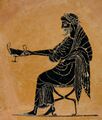Melampus (nonfiction): Difference between revisions
No edit summary |
|||
| Line 7: | Line 7: | ||
According to Herodotus and Pausanias (vi.17.6), on the authority of Hesiod, his father was Amythaon, whose name implies the "ineffable" or "unspeakably great"; Thus Melampus and his heirs were Amythaides of the "House of Amythaon". | According to Herodotus and Pausanias (vi.17.6), on the authority of Hesiod, his father was Amythaon, whose name implies the "ineffable" or "unspeakably great"; Thus Melampus and his heirs were Amythaides of the "House of Amythaon". | ||
== | == In the News == | ||
<gallery mode="traditional"> | <gallery mode="traditional"> | ||
File:Dionysos kantharos.jpg|link=Dionysus (nonfiction)|[[Dionysus (nonfiction)|Dionysus]] (on kantharos). | |||
</gallery> | </gallery> | ||
== | == Fiction cross-reference == | ||
<gallery mode="traditional"> | <gallery mode="traditional"> | ||
</gallery> | </gallery> | ||
== Nonfiction cross-reference == | |||
* [[Dionysus (nonfiction)]] | * [[Dionysus (nonfiction)]] | ||
Revision as of 19:08, 22 June 2016
In Greek mythology, Melampus /mᵻˈlæmpəs/ (Ancient Greek: Μελάμπους, Melampous), was a legendary soothsayer and healer, originally of Pylos, who ruled at Argos.
He was the introducer of the worship of Dionysus, according to Herodotus, who asserted that his powers as a seer were derived from the Egyptians and that he could understand the language of animals.
A number of pseudepigraphal works of divination were circulated in Classical and Hellenistic times under the name Melampus.
According to Herodotus and Pausanias (vi.17.6), on the authority of Hesiod, his father was Amythaon, whose name implies the "ineffable" or "unspeakably great"; Thus Melampus and his heirs were Amythaides of the "House of Amythaon".
In the News
Dionysus (on kantharos).
Fiction cross-reference
Nonfiction cross-reference
External links:
- Melampus @ Wikipedia
